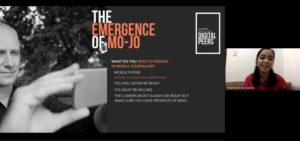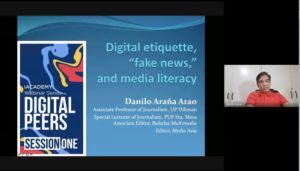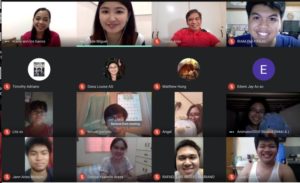Makati-based school iACADEMY has moved to create and promote a safer digital environment for its students through a webinar led by veteran practitioners in the field of broadcasting and journalism.
On its first episode of the iACADEMY Webinar Series: Digital Peers, TV5 Senior Correspondent Maeanne Los Banos, and UP Journalism professor and Media Asia editor Danilo Arao gave an online lecture to iACADEMY students with regard to the importance of media literacy especially in time of COVID-19, the fight against “fake news” or misinformation and disinformation, and the digital etiquette that will guide students in becoming responsible digital citizens.
Seasoned TV5 reporter and Journalism lecturer Los Banos begun her discussion by introducing the concept of “mobile journalism”, and how the students can maximize the power of their mobile phones.
“Mobile Journalist is not for journalists alone. It’s for the citizenry – it’s the citizens using their phones to document the things around them” said Los Banos.
Los Banos tackled the different sources of news which include online platforms. According to her, online sources are prone to “fake news” or disinformation and misinformation.
“Technically, we don’t use the term ‘fake news.’ It is about ‘misinformation or disinformation.’ Misinformation falls in inaccurate information. Disinformation is misleading information propagated deliberately to deceive the people” Los Banos added.
The audience was challenged with the questions as to why we continue to fall victim to fake news and why we continue to consume fake news. Based on the September 2018 Pulse Asia survey on Social media use presented by Los Banos, it showed that 88% of Filipino users are aware that fake news exists in social media while 79% admit that fake news is widespread on online platforms.
Digital etiquette
In the second half of the webinar, UP Journalism professor and also an Associate Editor of an online news magazine, discussed the importance of Media and Information Literacy (MIL) and digital etiquette in the time of COVID-19.
“Trolling and fake news peddling may be done wittingly or unwittingly. We should define the terms of engagement and draw the line between truths and lies. That’s where media literacy and digital etiquette come in. We have to keep in mind the fact that we have to be sensitive to each other’s needs and preferences. The keyword here is ‘respect’,” according to Arao.
Tips on how to be critical and responsible social media users
In terms of being critical and responsible social media users, Arao advised students to be “very critical.” “Don’t just believe everything you read, watch or listen to. In journalism, we need to develop a critical audience and not a passive audience…don’t just depend on one source of information. Multi-sourcing is the key.”
In spotting “fake news,” Los Banos emphasized the importance of fact-checking and verifying sources before disseminating. According to her, one of the indications that information may be wrong or misleading is when the headline or the story is controversially written or exaggerated.
“As a responsible social media user, if you are not sure if it is real or not, do not share or post it on your site or page. You will be part of the chain of propagating fake news. Verify and validate. Refuse to be confused,” said Los Banos.
On defending press freedom
During the Q and A part of the webinar, Los Banos and Arao were asked by students on issues regarding their stand on current issues, one of which is the Anti-Terror Bill.
“Part of the normative standards of journalism would be for journalists to take a stand whenever press freedom is threatened. That happened during the time of Martial law. Right now, there is creeping authoritarianism under the Duterte administration. We have to defend our basic freedoms and part of those basic freedoms would be press freedom” said Arao.
Meanwhile, Los Banos emphasized the duty of journalists to remain objective and factual.
“The responsibility of journalists is not to make the government officials or the politicians feel good. As long as we are reporting the truth, it is objective, it is factual, we will still report it” Los Banos added.
“As our school shifts to a flexible remote learning arrangement, we deem it important for our students to be informed about the current issues and become responsible digital citizens. Our first session of speakers did a really great job in educating our students regarding media literacy and digital etiquette, and we expect more engaging discussions like this in our future webinar episodes,” said Vanessa Tanco, iACADEMY President and CEO.
iACADEMY Webinar Series: Digital Peers was attended by current and incoming students of iACADEMY. The second episode of the webinar is scheduled on July 28 where lawyers from AYALA (Aquende, Yebra, Aniag, Loon & Associates) law firm will give a lecture on cyberbullying and cyber libel.
Do you have a story for the WhenInManila.com Team? Email us at story.wheninmanila@gmail.com or send us a direct message at WhenInManila.com Facebook Page. Interact with the team and join the WhenInManila.com Community at WIM Squad!







